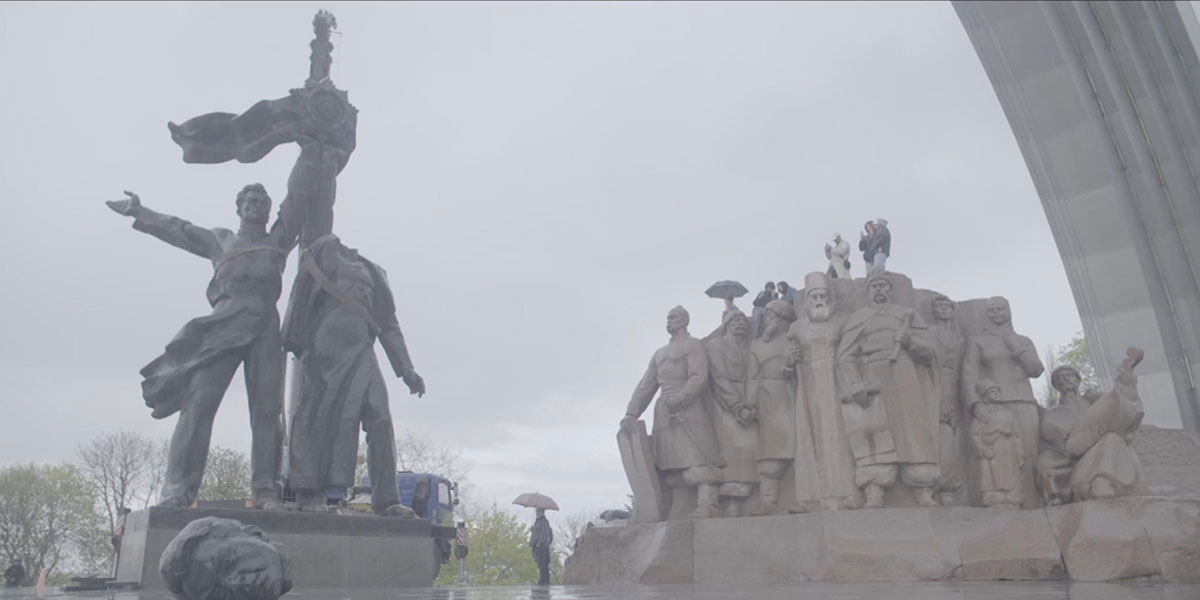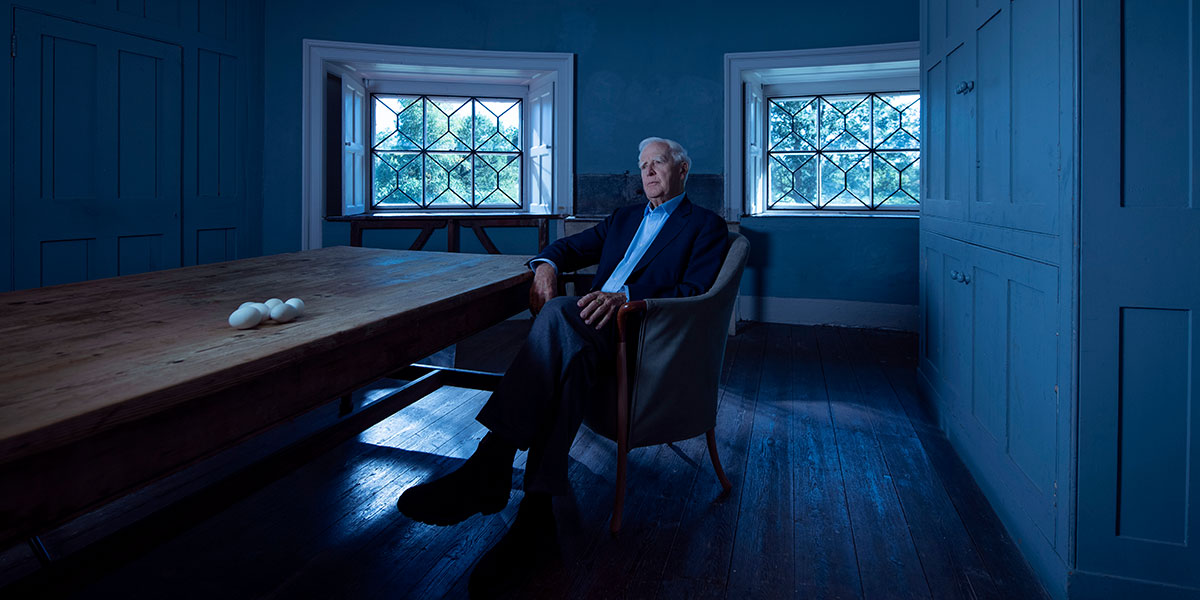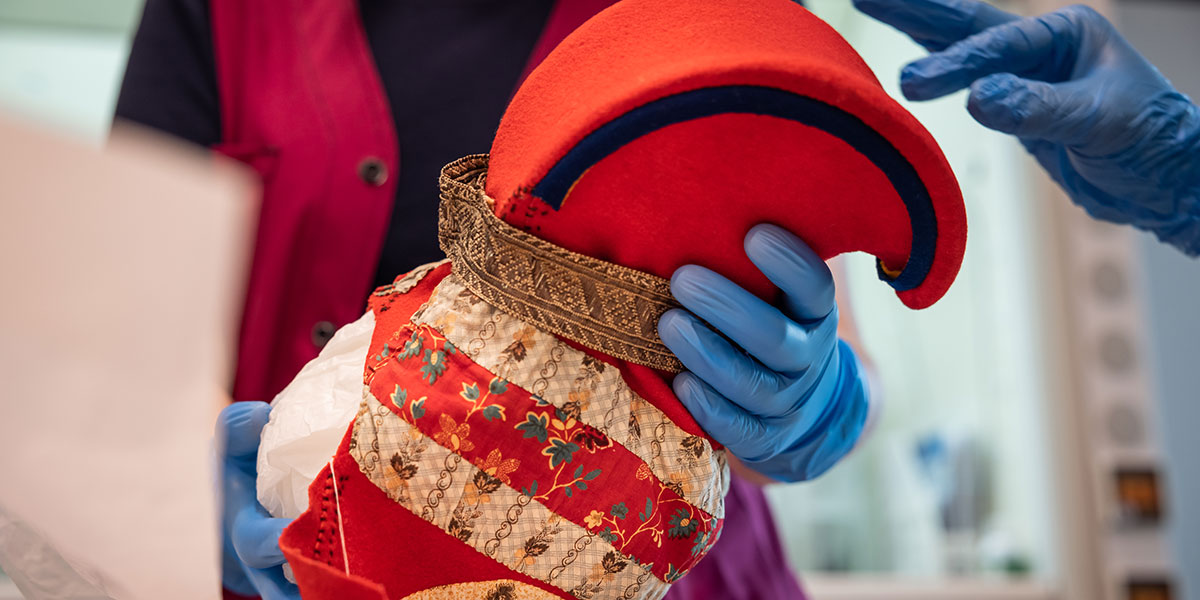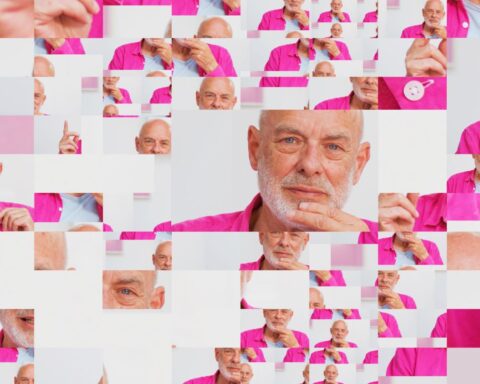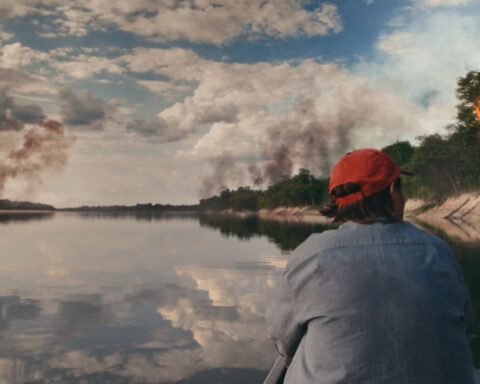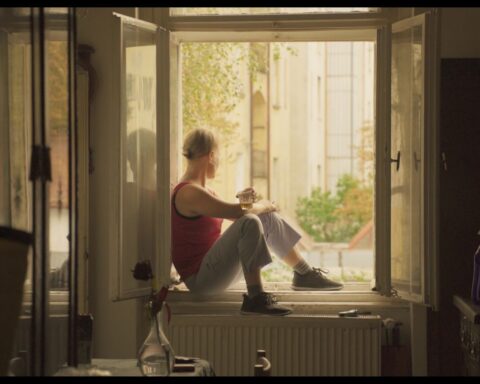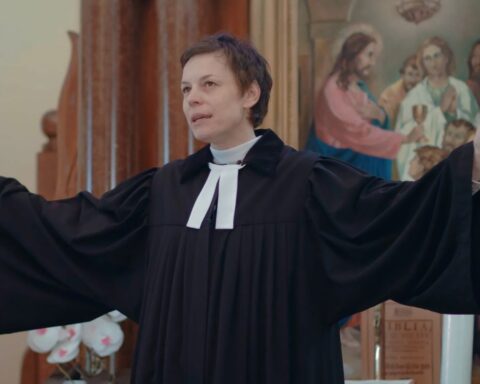There have been dozens of films documenting what’s taking place in Ukraine since the 2022 invasion, but there’s nothing quite like Defiant. With remarkable access, director Karim Amer and producer Mike Lerner, veterans of TIFF with their Oscar-nominated film The Square, along with producer Odessa Rae (Navalny) and other collaborators, follow a number of the key members of the political elite as they rise to the occasion diplomatically, militarily, and even technologically in their existential fight with Putin’s invading army.
From the charismatic and capable foreign minister Dmytro Kuleba, to Deputy Prime Minister Iryna Vereshchuk, Minister of Digital Transformation Mykhailo Fedorov, and peace negotiator (and newly installed defense minister) Rustem Umerov, we see the men and women at the tip of the Ukrainian response, with the much more documented Volodymyr Zelenskyy floating through the story as well.
POV spoke with Amer and Lerner minutes after the film locked prior to its World Premiere at TIFF 2023.
POV: Jason Gorber
KA: Karim Amer
ML: Mike Lerner
The following has been edited for brevity and clarity.
POV: You guys seem to have a knack for finding moments of history that are constantly changing. Can you talk about what it’s like to try to tell a story that takes over a year to capture, but is constantly evolving?
KA: When I explain it to film subjects in these kinds of situations, I note that we’re using characters who are human vessels, so to speak, who are surfing big geopolitical waves. I’m not a good surfer – if I was one, I wouldn’t be a documentarian [laughs] – but it’s the same idea. You’re waiting and waiting around for that one big wave, for that one moment, and you jump on it. The character is the surfboard, the vessel by which you can capture a slice of the big event. It’s not the whole wave—it’s just a split moment of it.
Because I grew up between East and West, I am always trying to translate the world. We can get lost in jargon, lost in political beliefs, but human moments are universal. Our goal is to take complex issues, whether it’s the Arab Spring, the data fuckery of social media, or the war in Ukraine, and encapsulate moments with humans.
I dream, every time I finish a film like this, that the next one’s going to be a biopic, a film about a dead person. Then I get sucked into another thing like this. Maybe I’m just a sadist; I don’t know.
POV: After watching this film and preparing for our interview, I see on the front page of CNN that one of your major characters has been fired. The next day, one of your other major characters now has that job. Is the artificial deadline of a festival interfering with the actual real-world implications of this storytelling?
ML: I don’t really think too much about it. We have these incredible opportunities, and we try and be in the room following these characters as closely as we can for as long as we can. Hopefully then there’s a good film in there.
I’ve just been making a film with the Belarus opposition for the last three years, and the first hour of our rough cut is the first three weeks. It’s a bit like this: we go there, we’re there for six, seven months, whatever it is, and a million things happen. It’s not until you get back here that you can see what the shape of the story is. In terms of finishing on the deadline, I think it’s good to have a deadline. Otherwise you would just keep going.
KA: Mike was the one who told me when I was panicking with The Square that you don’t actually finish a doc, you just run out of time.
ML: Exactly. Time or money or both.
KA: But we promised [TIFF Docs programmer] Thom Powers we wouldn’t do what we did with The Square!
ML: Yeah, we made him a promise. Also, with this film, it was good we decided to stop filming. We basically did [stopped] in January with the end of the film, essentially, the UN general assembly. That was bookended very nicely one to another. We never were going to cover the whole war from beginning to end, so it made sense to focus on the first year.
KA: The responsibility is to the story, not to the festival. We have to make something that will stand the test of time, and I think that’s a very important responsibility. We’ve been given this access, by these incredible people who are serving their country, unexpectedly answering the call of duty, in a wartime situation, and they expect that as well…Our commitment is to the story and to the characters and to making sure that we make something that feels like their journey has come to fruition.
ML: The U.S. has its own fight for the preservation of the rule of law and order with the Trump trial. It’s as serious as that. If Trump gets away with it, then there’s civil war in America because there’s nothing to stop you doing this stuff. Of course, Trump and Putin are very closely linked in many other ideological and philosophical ways.
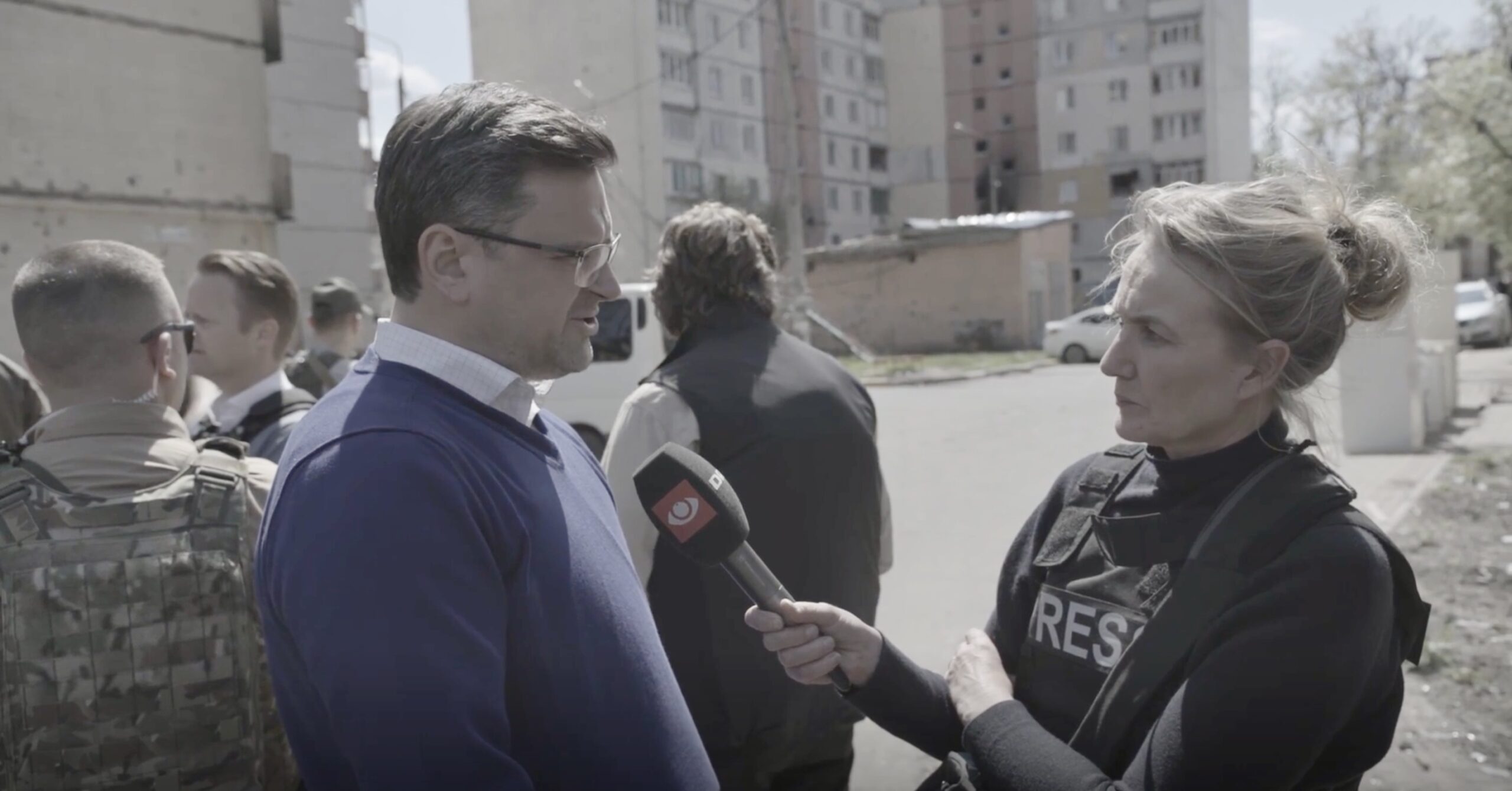
POV: Karim, as a gentleman of Middle Eastern descent, you are aware of people saying on social media that we only care Ukraine because it’s in Europe? We don’t care enough about Syria, Yemen, or Africa? Can you respond as somebody who is obviously absolutely acute to those arguments, but has still chosen to focus his camera on this particular conflict?
KA: That’s a very good question, and it’s something that weighed on me a lot. Fascism is fascism. The use of violence against innocent people is the use of violence against innocent people. We need to get to a level of consciousness that you see in the environmental movement perhaps, where we believe in global warming and that the Earth is not flat. Everyone understands now that if Brazil sets fire to the Amazon, it affects us no matter where you live. It’s not just a Brazilian event, it’s not singular to the geography of the country. With human life, we don’t have the same level of consciousness.
We saw that with The Square, where we assume that the fight for freedom in the Middle East would be something that the whole world thought affected it, but then a lot of us who stood for freedom in that country were left aside to hang in the dry. There’s deep Western hypocrisy to the ideals that the West espouses, like democracy, like rule of law, and the need to hold people to account. Putin’s ability to do what he’s done is in part because of this hypocrisy and the inability of the West to stand for its own values.
We’re not in a situation like we were in the Cold War. What we’re faced with now is a hyper-capitalist West versus a fascist, Putinist gang on the other side. The Putinist side is all the more dangerous because what it’s calling for is a return to the law of the jungle, where one strong man controls and shapes the story of a people. The tactics that Putin was using with Wagner‘s group, for example, was practising for Ukraine on Syrians. Right now, we’re faced with a battle for the survival of the world order as we know it, once that’s done, don’t think we’re not going to come for war crimes in Iraq. We will get to those. It may not be now, but we’ll get to that. We won’t forget.
POV: What would you say to those that believe that you are softening some of the complexities of the story in Ukraine? You present these figures in reasonably heroic ways, they’re still human, you’re not doing hagiography, but as evidenced by what has happened this week, these are still operators within a political environment.
ML: We made this film for really one reason and that was to establish the urgency and necessity of supporting Ukraine to its ultimate victory. And just to get back to the point you made before about the ethnic dimension of our support for Ukraine: Tens of thousands of people died in the Balkans, they were white. I don’t think the ethnic makeup of the Ukrainians is actually the key reason why we are so urgently helping them. The reason we’re so urgently helping them is because Vladimir Putin has a huge arsenal of nuclear weapons. His threat to the rest of Europe is very real, and we wouldn’t be helping him otherwise. We’re helping them because we’re helping ourselves and we’re defending ourselves against even greater disaster. This is a very important moment in human history.
KA: I only became interested in the story when I met Rustem [Umerov], to be totally honest. I was just very interested in information warfare. Then I meet this guy, and he’s Crimean. He’s Muslim, a Tartar, and I knew nothing about that. More interestingly, he’d just been poisoned with Abramovich and he’s having these crazy meetings. I’m a geopolitical nerd, and through him, I’m getting these snapshots of these closed door back room meetings. Then he told me that he had to cut our meeting short as the next day he was going to meet the Pope in Rome to deliver a message from Zelenskyy.
So, here’s a Jewish president who has a Crimean Muslim guy who works for the opposition party, and he has him serving as peace envoy doing these backroom deals, then he’s sending him to go meet with the Pope. This is a crazy story!
POV: How do you not get too close to these characters? How do you maintain a level of editorial distance to ensure that you’re providing a three dimensional view of them?
KA: I think there are two ways: First, with these characters, they’re actually just too busy to get too close to. They’re so busy fighting a war, and becoming close to a filmmaker isn’t really their priority. They’re literally fighting for the survival of their entire nationhood. You understand the value of time in a very different way when you’re dealing with people who are operating in a wartime country. Every second, people’s lives are on the line.
I fundamentally believe that Putin could end this war tomorrow if he wants to. This is not a he said, she said situation. One country is on the verge of being eviscerated forever, and the other is being led by a group that wants to erase its foe from history.
ML: Regarding the issue of editorial independence, we are very experienced filmmakers of this kind of film. As for access, we were the only people there asking them for this. Certainly no one had come to them and said can we follow your work and try and explain to the rest of the world why Ukraine must win? And we do believe Ukraine must win.
People will try to say, “Doesn’t Russia have some kind of claim to Crimea?” That is just Russian propaganda bullshit. The fact is, this is the most important struggle against tyranny that we have experienced in our lifetime. We have to win, and we made the film because we want Ukraine to win.
KA: We are not Ukrainian, but we understand the ripple effect of this situation. We’re living in this hyper-polarized state of anxiety. With Trump, he’s either going to win, or he’s going to go to jail. There’s nothing in between. With Ukraine, it’s either a huge symbol for freedom everywhere, or it is the ultimate carte blanche to fascist dictators all over the world.
The blessing and curse of what we had is that our characters only become more relevant with time in the war. The characters of The Square, for example, became less relevant to the story of Egypt after that story ended. The story of the fight continues, but it’s not about them anymore. In many films, it’s like that. But with Ukraine, these people are still very much the tip of the spear of the war effort. And the war is not over. And we have no idea when it’s going to be over. So, from a filmmaking perspective, we were lucky that our characters’ relevance was maintained.
POV: How much did you change the cut at all when Rusnikov was fired?
KA: It was already locked.
POV: Not even white text on a background saying that he’s been fired?
KA: No. It’s very complicated, there’s still a parliamentary inquiry. It’s very tempting in a film like this, to constantly update it because there’s so much happening. At one point, we thought it might be a series, maybe something episodic. But there just isn’t an appetite for political filmmaking right now from those who used to be ready to provide funding. One would think that with the biggest conflict since World War II, you could get a series put together, but here we are. We are an independent film that is deeply in debt – thank god for Mike bringing on Channel Four, who with one phone call while we were in Ukraine decided to support us. Otherwise we’d be dead in the water.
ML: We quickly realized the responsibility that we had to tell this story, with the hope a film can change minds. What really disturbs me so much now more than ever is this reluctance to understand the reality of this war and the reality that there’s no two sides. We should have realized on February the 24th what Syria was all about, what Georgia was all about, what Chechnya was all about: how a cozy relationship and appeasement of Putin is what’s led us to this point. He poisoned people on the streets of Britain, he shot down civilian airliners. Like Trump, these men think they can do what they want and there’s no consequence. And that’s why there has to be a consequence.
KA: It’s a bipartisan failure. I’m obviously not supporting Trump—I’m vehemently against the Republican Party—but the Democrats, and liberals in many Western countries failed as it relates to the Russian policy. That’s why we’re here in many ways.
POV: This is obviously not the first Ukrainian doc, but you do two things that are remarkable. One, you have incredible access to individuals who are not Zelenskyy, who is a fascinating and complex person, but has gotten plenty of attention. You’re focusing on very interesting “secondary characters” are the ones doing the work. But you also have not made it about yourselves, as some other actors have done.
KA: It’s not about us. Even with The Square, we didn’t make it about us, and we were there, living it and operating within it. It’s just a certain school of filmmaking that you realize that you’re not the story. I’ll write a book about that if you want! [Laughs.]
ML: There are two schools of filmmaking. One is to follow, and one is to lead. We follow. We just follow. How did we get these characters? Well, with a lot of luck as much as anything, and just being in the right place at the right time. Plus, no one else was interested.
KA: We kept looking around and being like, “Where are the other film crews?” We couldn’t find any.
ML: This is an existential fight for truth and justice and peace and it’s nothing smaller than that. It changed my whole view of the entire life I’ve led up to this point.
KA: One person I love is Buckminster Fuller. He said there’s only two kinds of humans: humans who are alive, and humans who are dead. We have to get out of these false vessels of identity and just accept the fact that we are interdependent. We thrive together or we die together. As a filmmaker, I think we have a role, not a massive one, but a role nonetheless to constantly deliver that message. Both of us gravitate to these urgent stories because we care that fascism is defeated.
ML: All of our films are about resisting tyranny, small and big. We’ve always accepted that we’ll never defeat tyranny. But we have to resist it.
KA: I used to believe we could. [Laughs.]
Defiant premieres at the 2023 Toronto International Film Festival.
Get more coverage from this year’s festival here.




